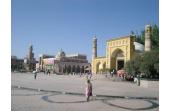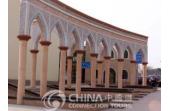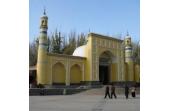Id Kah Mosque
- Things to do
-
- Photo(16)
- Tips&article(6)
- Make it Happen
- Map
-
loading...
The Idgar Mosque, is one of the largest mosques in China. It is extremely popular among the Muslims in Xinjiang.
The Mosque was first built in 1442 with a history of over 500 years. The building complex is in a grand Islamic style with strong religious features, which consists of a gate tower, a courtyard, a doctrine-teaching hall and a big Hall of Prayer.
Winding through Tower Gate, visitors will see a big Courtyard. On the south and north sides of the courtyard lines 18 doctrine-teaching halls. In the courtyard, poplar trees tower high up against the blue sky, pines and cypresses flourish. The whole yard is heavily shaded. A pool with crystal water in the yard like a pearl embeds among the lush vegetation. The yard provides a tranquil and secluded environment for relaxing and refreshing.
The Hall of Prayer is built on a high platform and it contains three parts, the Inner hall, Outer hall, Hall Entrance which are all on the dais over 1 meter higher the ground. The roof of the Outer Hall is supported by 140 light blue wooden pillars. The 7-meter-high pillars were laid out on a grid pattern, which were artistically spaced. On the roof and the pillars are exquisite carvings and beautiful pictures. The brick gate tower faces the Id Kah Square. This tower is full of elaborate flower-pattern carvings, mainly in green.
Each day, around two-three thousand people come here to worship and the number increases up to six-seven thousand every Friday. During religious festivals, the number of Muslims piously kneeling around the mosque reach 40,000 or even higher. Over years, the Idgar Mosque has become a sacred religious place as well as a place for celebrating important festivals.
"Idgar" means festival worship and assembling place in the local dialect. The square outside the mosque thus so called as Idgar Square. The square is a good location for a leisurely walk, doing small business and traveling. But on important occasions such as the Coban Festival, the square is filled with enthusiastic Muslims who bit drums and play suona horn to celebrate their own festivals.
Usually all the Muslims in Xinjiang Uygur Autonomous Region will come this sacred places on the day. They get together at the square, in front of the mosque, dancing, playing overnight. The unprecedented scene is a quite unique scene which has attracted lots of visitors to come to participate.
take bus No. 77 or 13 from downtown area; medium-size busHow to Get to there?
Tips & articles
|
|
|
forum discussion
|
|
|












